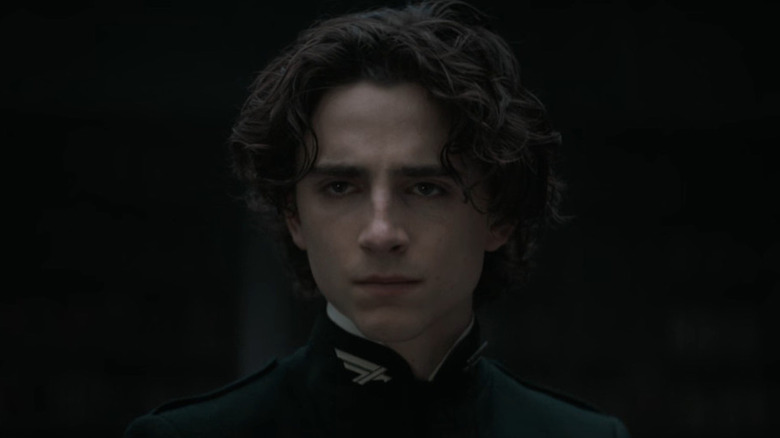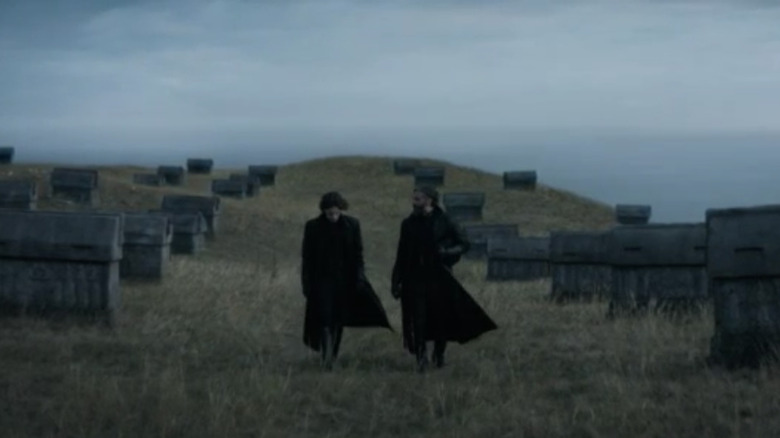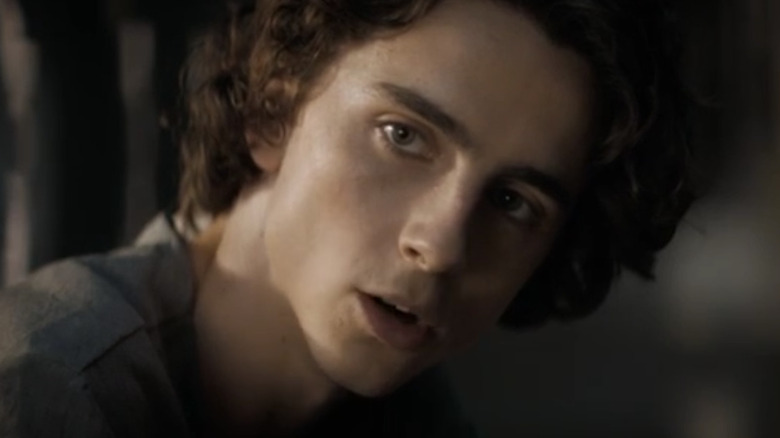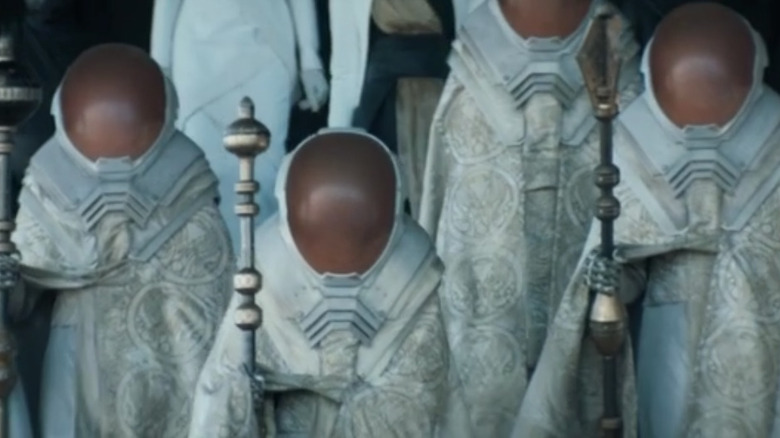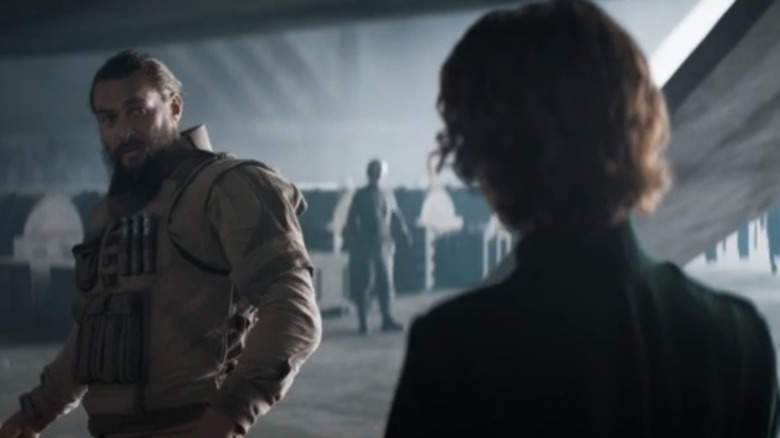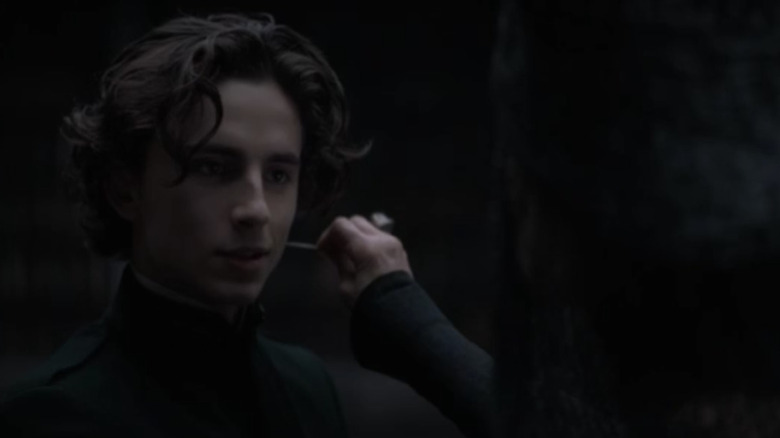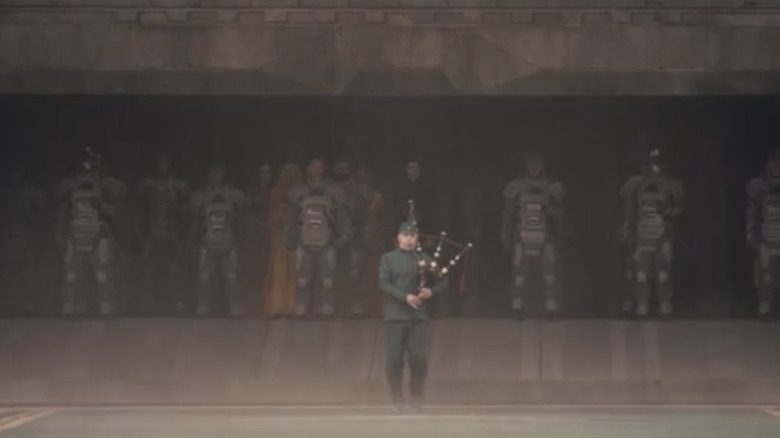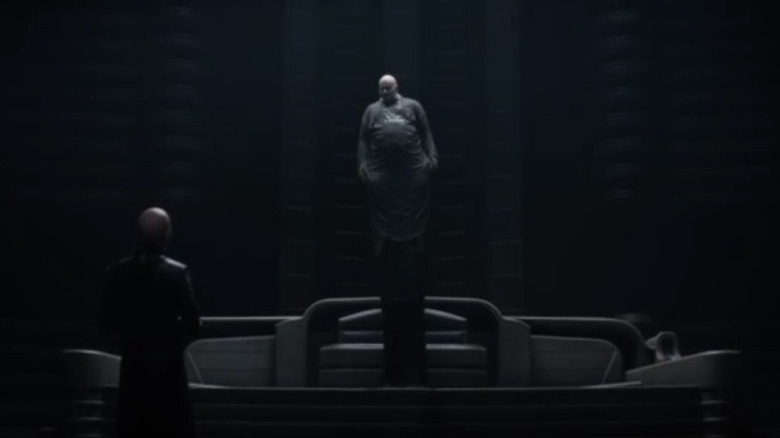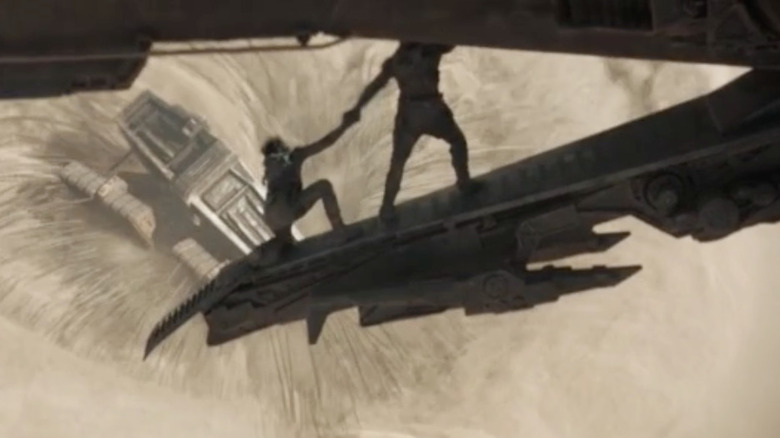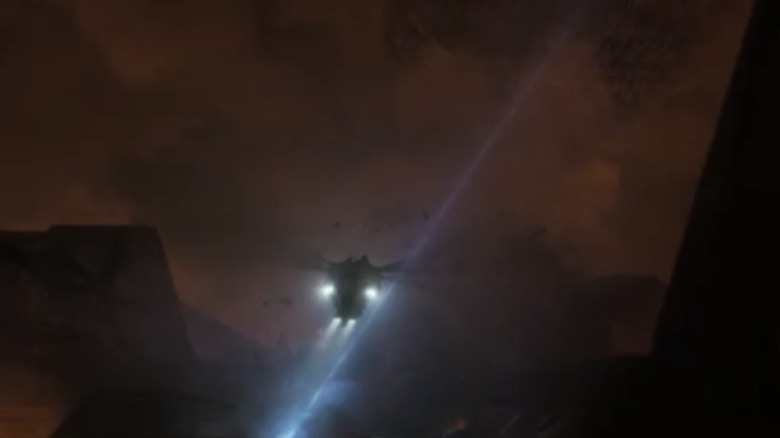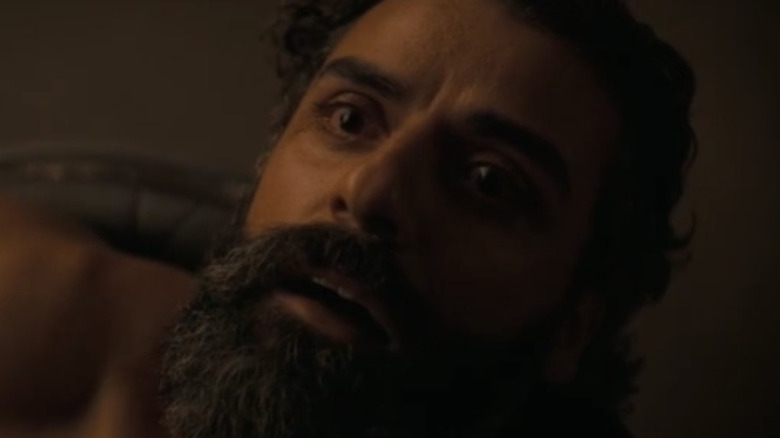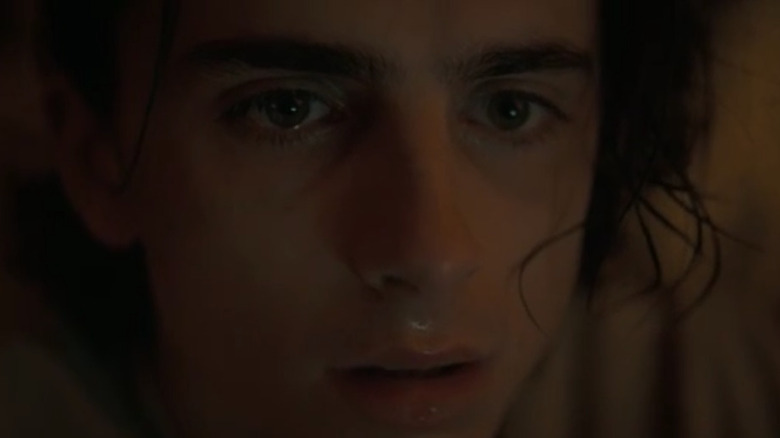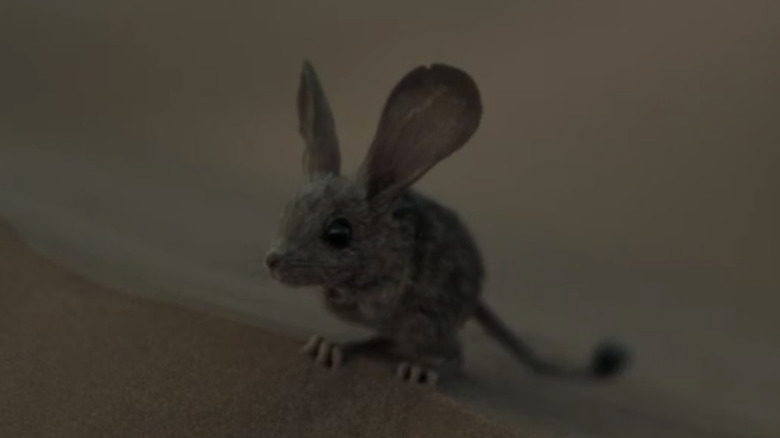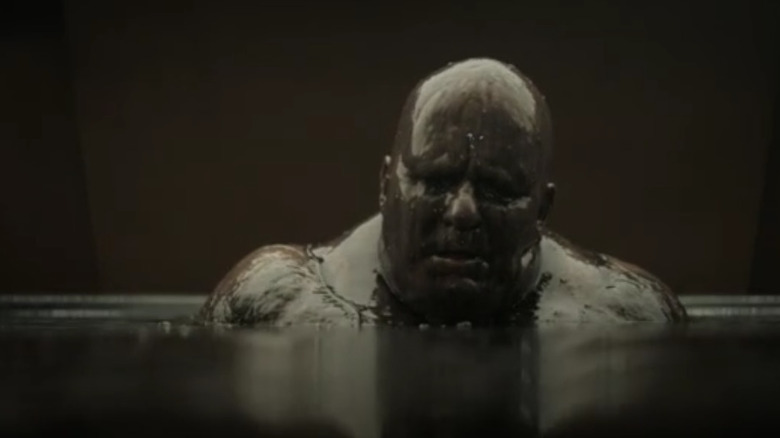The Most Pause-Worthy Moments In Dune
Immense in both its sense of scale and narrative ambition, "Dune" is one of the biggest sci-fi epics to hit the big screens without the prefix "Star Wars."
Adapting the first half of Frank Herbert's monumental 1965 sci-fi novel, "Dune" begins with an uneasy exchange of power: the imperially-mandated transfer of the planet Arrakis from House Harkonnen to House Atreides. As the sole known source of the precious resource known as "spice," Arrakis is simultaneously a financial boon and a death trap to the Atreides clan. Furthermore, for the noble family's young heir, Paul, the desert planet marks the kindling of a great and terrible purpose that will set the universe ablaze.
Directed by Denis Villeneuve, the 2021 film has been accepted by audiences and critics alike as the most successful big-screen adaptation of Herbert's text to date. While (and apologies to David Lynch) that bar was embarrassingly low, the lucidity of Villeneuve's film is, nevertheless, no small feat. Herbert's text is dense, suggestive, and largely considered to be "unfilmable." Luckily, not unlike Paul himself, Villeneuve has a talent for surrounding himself with incredible allies. Names like cinematographer Greig Fraser and production designer Patrice Vermette, who embody the principle of "show don't tell" where lesser creatives might have buckled to the thrall of exposition.
There are scenes, shots, and sequences aplenty in 2021's "Dune" that demand closer inspection. From action-packed acts of betrayal to meaning-rich metaphorical rodents, here are some of the most iconic moments in Villeneuve's "Dune: Part One."
Warning — spoilers below!
Saying goodbye to Caladan
We're first introduced to the homeworld of House Atreides by the gentle pitter-patter of early morning rainfall. It's a sound that will soon fade into memory when the noble family moves to the arid deathtrap of Arrakis. Bathed in cool blues and blanketed in greenery and gentle oceans, Caladan is the polar opposite of the forbidding desert planet. House Atreides has been ordered by the Padishah Emperor to leave their temperate home, and to assume control of the only known planet capable of producing the all-important spice.
These early glimpses of Caladan are bittersweet in their impending, ominous contrast with the arid, hostile, sun-baked planet colloquially known as "Dune." As we admire sprawling, grassy knolls and dramatic seaside cliffs, we're keenly aware that such plant life, and more importantly, such water will be in short supply on Arrakis. So can you really blame us for drinking in the scenery, as it were?
Paul and Jessica using Voice
One of the many hurdles in adapting Frank Herbert's text from the page to the screen is the problem of how to represent Voice. Voice is one of the most impressive and terrifying physical feats of the Bene Gesserit: a vocal technique that allows practitioners to control, demand, and compel others merely by employing a specific vocal tone. To outsiders, Voice has the appearance of dark magic. In reality, like all of the Bene Gesserit's tricks, Voice is a physical skill that can be learned, practiced, and fine-tuned. Even still: how do you represent something like that on-screen?
Villeneuve introduces us to Voice shortly after we've met our key players: Paul and his mother, the Lady Jessica, who has defied the strict rules of her Sisterhood by giving her son Bene Gesserit training. Voice is a muscle that must be trained frequently ... even over breakfast. Before he can thank his mother for pouring him a glass of water, Jessica entreats Paul to ask her for it with Voice. After a half-hearted attempt, a palpable air of focus passes over Paul's face. Then, before his lips move, we hear it: low, throbbing pulses, muffled as if underwater, prefacing the impact of the command to come like a sonic boom. With interlocking, twisting voices, Paul asks Jessica to give him the water, and overcome with a mental haze, she complies. Voice in Villeneuve's "Dune" is like an underwater torpedo; you feel it in the rumbling of your speakers long before lips begin to move. It is compelling every time it happens, but the first instance is certainly the most shocking.
A glimpse of the Spacing Guild
As Paul learns more about his new home (by the way, that soothing British exposition is brought to you by the film's editor, Joe Walker) we're introduced to a critical explanation of why spice is so important. The Guild Navigators are utterly dependent on the prescient powers of the Spice Melange to achieve interstellar travel. Without it, they would be quite literally flying blind. So: no spice, no space travel.
To hammer the point home, as it were, we're swiftly granted a brief (and titillatingly incomplete) glimpse of the Guild itself. Accompanying the Emperor's envoy, who has come to Caladan to formalize the Atreides' control of Arrakis, are a striking group of white-robed figures. With opaque glass helmets clouded with spice and attire that feels more suited for the Vatican than a spaceship, the figures are our only glimpse of the Guild in "Dune: Part One." Fans of the book (and David Lynch's adaptation alike) are keenly aware of the spectacle and oddity associated with the Guild Navigators, who are mutated into monstrous, aquatic creatures through their exposure to massive amounts of spice. But, as Villeneuve himself confirmed in an interview with Empire Magazine, these evocative white robes are merely representatives of the Guild, not Navigators as so many of us had hoped. Then again, if these intimidating figures are just representatives, consider our appetites piqued for the real, and presumably more horrifying, deal in "Part Two."
Duncan Idaho's relationship with Paul
One of Duke Leto's right-hand men as well as one of Paul's many, many teachers, Duncan Idaho is a loyal pillar of House Atreides. Even though Idaho's screentime may be paltry, we're immediately gifted with a clear and unambiguous demonstration of Duncan's importance to the House. In Villeneuve's adaptation, Duncan is like an older brother to Paul. And when the two are reunited early in the film after Duncan returns from a flight in preparation for an advanced scouting mission to Arrakis, they greet each other with the warmth and camaraderie of siblings: rushing to embrace one another on the landing strip.
While fans of the books may have their quibbles, the casting of Jason Momoa endows Duncan with an innate, and undeniable charisma that makes it abundantly clear why he matters to Paul. Duncan and Paul's relationship feels removed from the severity of court life and intergalactic politics: they're not just a master and a pupil, they're bros. And much like the lushness of Caladan, Duncan's undeniable warmth and casual ease have a bittersweet tinge. Duncan and Paul's relationship has an innocence to it that Arrakis is keen to snuff out. So while we'll always relish Momoa going in for a bear hug (and the "my boy!" is the icing on the cake), their friendship is yet another notch in the things Paul will be forced to sacrifice on Arrakis.
The Gom Jabbar Test of Humanity
Whether you're a die-hard fan of the books or only possess a peripheral understanding of "Dune," there can be no doubt: the most well-known scene is the Test of Humanity. Playing out in Villeneuve's film almost identically to how the scene unfolds in Frank Herbert's text, the Test of Humanity begins with the ominous arrival of the Reverand Mother Gaius Helen Mohiam, Lady Jessica's Bene Gesserit mentor and the Truthsayer to the Padishah Emperor himself. Mohiam has arrived under the cover of darkness to administer a test on the young Paul Atreides to see if he is truly human. Jessica has defied her sisterhood's matriarchal rule by training her son in the Way. So Mohiam has arrived to put Paul's abilities to the test.
After compelling Paul to approach her using Voice, Mohiam orders Paul to place his hand in a suspiciously unassuming box. He does, and the old woman brings a needle to his neck. But not just any needle: a gom jabbar, a device tipped with a poison so potent it causes instantaneous death. If Paul removes his hand from the box, she will kill him. The longer Paul holds his hand within the contraption, the more pain he feels. This is the Test of Humanity: will Paul act like an animal and wrench his hand from the trap? Or will he persevere, mind over matter, like a human being?
While Jessica stands outside the locked room, reciting the Litany Against Fear, her son proves his humanity, and kindles Mohiam's suspicions that Paul may be the Kwisatz Haderach.
The pipes, the pipes are calling
Thinking machines may not have survived the Butlerian Jihad, but who cares when this future still has bagpipes? Upon their ceremony-rich arrival at Arrakeen, on Arrakis, House Atreides formally introduces itself to its new subjects with an unforgettable musical fanfare.
Fans of "Dune" know well that musical instruments play an important role in Frank Herbert's sci-fi epic. I'm sure many of us expected to catch an appearance of the fictional nine-stringed baliset favored by the likes of Gurney Halleck. Instead, the first in-universe musical instrument we're treated to in Villeneuve's "Dune" is bagpipes. For those curious, the Scottish publication The National was keen to get to the bottom of why, exactly, "Dune" has bagpipes. As Villeneuve put it: "I'd always seen Atreides as a kind of Celtic people. So I realized they couldn't just disembark their ship. They had to be – how you say? Piped out." Luckily for Villeneuve, composer Hans Zimmer was in Edinburgh, where pandemic be damned, there is certainly no shortage of bagpipes.
The Baron's suspensors
In Frank Herbert's text, the Baron is described as wearing anti-gravity suspensors, a belt-mounted device to support his corpulent frame, allowing the Harkonnen patriarch to hover and glide unencumbered. In David Lynch's "Dune" adaptation, the Baron doesn't just hover, he floats like an untethered balloon let loose by a clumsy child. While artistic license is all well and good, the ultimate effect is less intimidating and sinister and more surreal and silly.
But in Villeneuve's adaptation, the Baron's mobility aid is truly the stuff of nightmares: a metallic device, fused to his spine, illuminated in crimson lights. When he levitates, it is like watching a cobra fan out its hood. The word "float" feels too insignificant; he is taking up space in the way that the Harkonnen intend to devour the universe. Trailing his immense robes beneath him, the Baron looms large over his domain, eclipsing even the Reverend Mother herself as he revels in the surefire reality that the desert will claim the lives of both Paul and his mother.
Abandoning the spice harvester
Eager for a first-hand look at the collection of Arrakis' all-important spice, Duke Leto, Paul Atreides, and Gurney Halleck join Dr. Liet Kynes on a fly-by. The group assemble in an Ornithopter, operated by none other than the Duke himself, who in another life might have abandoned his political responsibilities to be a pilot. Hovering over the spice bed with the vessel's dragonfly-like blades, Dr. Kynes can no sooner mention the importance of scouting for worm signs than Duke Leto spots it: a massive plume of sand. A worm is coming straight for the crawler. And as Dr. Kynes casually notes, the workers will harvest until the last minute.
Everything is going as it should; the carry-all craft has landed to evacuate the crawler. But, be it accident or tampering, one of the carry-alls anchors fails to deploy correctly. Without skipping a beat, the Duke launches a rescue mission. While Paul reels under the effects of the stirred-up spice, rich in the air, expediting his latent prescient powers, Luke, Dr. Kynes, and Gurney rush the workers into the Ornithopters. And with alarming speed, the worm approaches like an unrestrained freight train, erupting solid sand into a churning whirlpool cascading down its toothy maw. After yanking Paul aboard, the passengers watch in awe as the massive worm engulfs the crawler, sucking it deep below the earth.
Salusa Secundus
As the throatier, more guttural aspects of Hans Zimmer's score push their way to the forefront, we are whisked away to Saulusa Secundus, a desolate prison planet. With harshness surpassed perhaps only by the conditions of Arrakis, Salusa Secundus' unforgiving environment makes it an ideal breeding ground for the Sardukar, the elite military force of the Padishah Emperor. Hardened by the unrelenting planet, the Sardukar are the stuff of nightmares: boogeymen, armed to the teeth, with unflappable loyalty.
After the warm, cinnamon-colored glow of Arrakis, the starkness of the cool-toned prison planet feels like an ice bath. We watch as hundred, maybe thousands, of armored Sardukar kneel and accept a pre-war rite (blood, collected from crucified bodies, smudged on furrowed brows). Only, what war could they be joining? And given that it was the Emperor himself who granted control of Arrakis to the Atreides, how could it be relevant to Dune?
The mystery soon unravels as Piter De Vries, the Baron's gaunt Mentat, converses with a Sardukar general: the Baron has struck some deal with the Emperor to make use of three battalions of the Imperium's elite forces, in order to snuff out the formidable House Atreides for good.
The Harkonnen assault on Arrakeen
Under the cover of darkness, betrayal erupts into treason. A trusted confident, Dr. Yueh, has lowered the Atreides' shields, unleashing Harkonnen funded Sardaukar into the streets of Arrakeen. As Hans Zimmer's score swells, fireballs fill the screen, massive, metal-plated ships descending from the sky, groaning like monstrous whales.
A bombastic sequence that should be enjoyed on the biggest screen possible, the attack on Arrakeen showcases the skill and ferocity of the Atreides forces and the Sardaukar alike. Bubbling flames tower above the palace, the sacred palm trees burning like matches against the night's sky. From finally getting a glimpse of Duncan Idaho's swordplay in action to the disarming sight of Lady Jessica bound and gagged, the assault on Arrakeen is one of the most disarming sequences in the film.
While defensive shields illuminate dark corridors, the more intimate minutiae of Dr. Yueh's motivations for giving up House Atreides begin to come into focus. He has opened the floodgates, yes. But his betrayal was more than just a likely vain attempt to save his wife. He intends to use this tragedy to kill the Baron.
Dr. Yueh's and Duke Leto's assassination attempt on the Baron
After incapacitating Duke Leto with a sedative, the treacherous and tragic Dr. Yueh describes his plot. He is going to replace one of Duke Leto's own back teeth for a fake, which when bit down on, will crush and expel a torrent of toxic, poison gas. If he chooses his moment well, Dr. Yueh explains, the Duke's final moments will also be the Baron's.
Duke Leto awakens in the Baron's presence. And while he has been stripped naked, as he comes to, he remembers the tooth. Thinking himself to be safe, the Baron feasts at the end of a massive table. Still chewing, the Baron levitates across the table to conclude his dealings with Dr. Yueh, granting him the ability to "join" his beloved wife by slitting his throat. Looming over the Duke, the Baron enumerates his victories: the vicious details of the fall of House Atreides. The corpulent Baron leans close to better hear the rasping whisper of the Duke, who has begun to reel out of his stupor at the mention of his wife and son. And then: he cracks the tooth, unleashing a hiss of gas straight into the Baron's face.
While we soon learn that Leto and Dr. Yueh's attempt was in vain, the scene itself remains an unambiguous testament to the Atreides' refusal to go down without a fight
Paul's vision of the Muad'Dib's Jihad
Resting in the stilltent provided for them by Dr. Yueh, Paul and Jessica recuperate after their daring escape into the desert. Whether brought upon by the trauma of the assault on Arrakeen, his exposure to spice, or more likely a combination of both, Paul begins to experience the first rumblings of prescience. As he lies in the tent, he glimpses a possible future. Chani, the Freman girl unavoidably bound up in Paul's destiny, smiles as she surveys the scene. In the trenches of a sandy valley, a war is taking place. Ferocious Sardaukar legions in their pale armored suits sprint through the sand as Freman forces rise up from under the dunes. We follow one figure in particular: a Freman warrior wielding two knives, whose gracefully weaves and flips between enemies like a dancer.
After dislodging one of his knives from an enemy's throat, the figure retracts their helmet. And there, breathing heavily, is Paul himself. In this vision of the future, Paul's eyes, whites and pupils alike, blaze blue with the characteristic Eyes of Ibad, a known feature of Freman who have been exposed to copious amounts of spice. Piles of immolated bodies fill Paul's mind as tears roll down his face. This is a vision of the Jihad that will be carried out his name, in the name of a ruthless religious war waged across the known universe in the name of Maud'Dib. It is a future Paul wishes to avoid at all costs: bloodshed, on his hands, in his name, for some as-of-yet unrevealed purpose.
The very symbolic desert mouse
If you aren't familiar with Frank Herbert's text, the recurring image of the desert mouse may seem a little odd. What is it supposed to symbolize other than the perseverance required to survive the desert of Arrakis? Well, we're glad you asked. The desert mouse and Paul Atreides are inextricably linked. The desert mouse is known in the Freman language as Maud'Dib, which is the name Paul Atreides chooses for himself upon his acceptance into Sietch Tabr. Maud'Dib is also the Freman name of Krelin, the second moon that orbits Arrakis. In the second book in the series, "Dune Messiah," Paul experiences a horrifying vision where the moon falls out of the sky; a gut-wrenching calamity that spells doom for everything he has worked to build.
Keen-eyed viewers with some familiarity Herbert's "Dune" might have noticed that the moon Maud'Dib has some brief screen time early in the film. And while the subject of conversation is the effect of the planet's larger moon on magnetic fields, Maud'Dib looms large in the background, a subtle hint of Paul's short and long-term destiny on Arrakis and the Universe at large.
The Baron's recuperation
As we all know, the best way to recover from having poison exhaled in your face is with a nice bath. After all, what could be more relaxing than steeping in thick, vicious, black tar?
Unfortunately for House Atreides, Duke Leto's poison tooth failed to kill Vladamir Harkonnen. And so the Baron recuperates, like a wet phone dunked in rice. Hairless attendants poor black pitch into his vat while the Baron himself remains unseen, submerged below the surface. The Baron's violent nephew, the Beast Rabban, stands at attendance to deliver the all-important debrief: there was a sandstorm the night of the assault on Arrakeen and there is no way that Paul and Jessica survived. Summoned by the notion that House Atreides has fallen, the Baron rises from the muck like a hippo. It is a frightening and striking image: a hulking man, submerged in dark fluid. He is slick with oil, a fitting metaphor given that all this killing and political machinations have been over a natural resource that is like gas and cocaine all in one.
